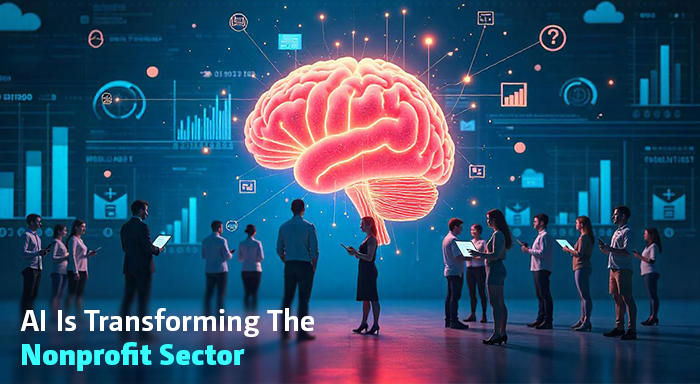Artificial Intelligence (AI) has quickly evolved from an online trend to a powerful tool that’s shaping various industries, including the nonprofit sector. Even while big businesses have been using AI for years, nonprofits are just now learning how to use it to increase productivity, streamline processes, and broaden their influence.
The Role of AI in Nonprofits
AI for nonprofits offers significant opportunities to streamline processes and improve decision-making. Artificial Intelligence (AI) can be a useful tool for businesses that frequently have limited resources, from automating repetitive operations to offering deeper insights about donor behavior.
AI-powered tools help nonprofits by:
- Automating administrative tasks such as data entry and scheduling
- Enhancing donor engagement through personalized communication
- Optimizing fundraising campaigns by predicting donor behavior
- Assisting with predictive analytics for better resource allocation
By implementing AI for nonprofits, organizations can focus more on what truly matters—furthering their mission and serving their communities more effectively. AI is becoming an essential part of business operations, enabling businesses to make more intelligent choices with less time and money spent.
Donor Engagement and Personalization
One of the most significant advantages of AI for nonprofits is the ability to better understand and engage donors. AI helps analyze donor data to identify patterns, preferences, and behaviors that would otherwise be difficult to recognize. With this information, nonprofits can create more personalized communication strategies, ensuring that each interaction is meaningful and relevant.
For example, AI tools can:
- Segment donors based on their past contributions and interests
- Automate personalized email campaigns that speak directly to each donor’s values
- Predict when a donor is most likely to contribute again, helping to plan fundraising campaigns more effectively
By offering tailored engagement, nonprofits can cultivate stronger relationships with their supporters, leading to more sustained contributions over time.
AI for Fundraising Optimization
Every charity organization depends on fundraising, and artificial intelligence is rapidly helping them generate more money with fewer resources. AI can predict which donors are most likely to give, how much they are willing to donate, and when they are likely to do so.
Some ways AI supports fundraising efforts include:
- Predictive analytics: AI algorithms can analyze past donation data to forecast which donors are likely to contribute in the future and which strategies are most effective in reaching them.
- Campaign optimization: AI can run simulations to test different fundraising strategies, allowing organizations to find the most efficient approach before committing time and resources.
- Automating outreach: AI-powered chatbots and email campaigns ensure that nonprofits are constantly in touch with potential donors without requiring staff to spend valuable time managing communication.
By leveraging AI, nonprofits can stretch their resources further, allowing them to do more with less.
Streamlining Operations
Nonprofit organizations often have limited budgets, and maximizing operational efficiency is crucial. AI has the potential to significantly cut down on the amount of time spent on repetitive operations like financial reporting, scheduling, and data entry.
Some areas where AI is making a difference include:
- Administrative tasks: AI tools can automate repetitive activities, freeing up staff to focus on higher-level strategic tasks.
- Volunteer management: AI can help nonprofits manage and schedule volunteers by predicting when they’ll be needed and optimizing scheduling to ensure adequate coverage.
- Financial tracking: AI-powered software can assist with budgeting, financial reporting, and tracking donations, ensuring transparency and accuracy without requiring extensive manual input.
AI allows NGOs to concentrate on their goal instead of being mired in day-to-day operations.
Data-Driven Decision Making
AI allows nonprofits to make more informed decisions based on data rather than intuition. AI technologies can offer insights into donor trends, program efficacy, and overall organizational performance by gathering and evaluating enormous volumes of data.
- Program evaluation: AI can assess the success of programs by analyzing participant data and feedback, allowing nonprofits to allocate resources to the most effective initiatives.
- Resource allocation: By using predictive analytics, nonprofits can better understand where to focus their efforts, whether it’s in fundraising, volunteer recruitment, or program expansion.
- Donor insights: AI can analyze donor data to identify which campaigns or programs resonate most with supporters, helping nonprofits tailor their efforts for maximum impact.
AI-driven insights help nonprofits allocate their limited resources where they are most needed, driving greater impact with fewer resources.
Ethical Considerations and Challenges
With the many advantages of AI, charity organizations must also be mindful of its ethical implications. For example, the use of AI involves handling vast amounts of sensitive data, including donor information, financial records, and program data. It is extremely important to make sure that this data is utilized responsibly and is kept safe.
Nonprofits should also be aware of the potential biases inherent in AI algorithms. AI systems are only as good as the data they are trained on, and if that data contains biases, the resulting decisions and insights may be skewed. Nonprofits need to monitor AI tools regularly to ensure they are working as intended and do not perpetuate harmful biases.
Conclusion
The integration of AI into the nonprofit sector presents numerous opportunities for growth, efficiency, and impact. AI for NGOs can help organizations make data-driven decisions that improve their capacity to serve communities, streamline operations, and better engage supporters.
The potential advantages of using AI greatly exceed the risks, notwithstanding certain difficulties. As AI technology continues to evolve, nonprofits that embrace its capabilities will be better positioned to achieve their missions and make a lasting impact on the world. AI presents a future in which nonprofit organizations can use technology to assist address some of the most important issues facing society and accomplish more than they have in the past.








